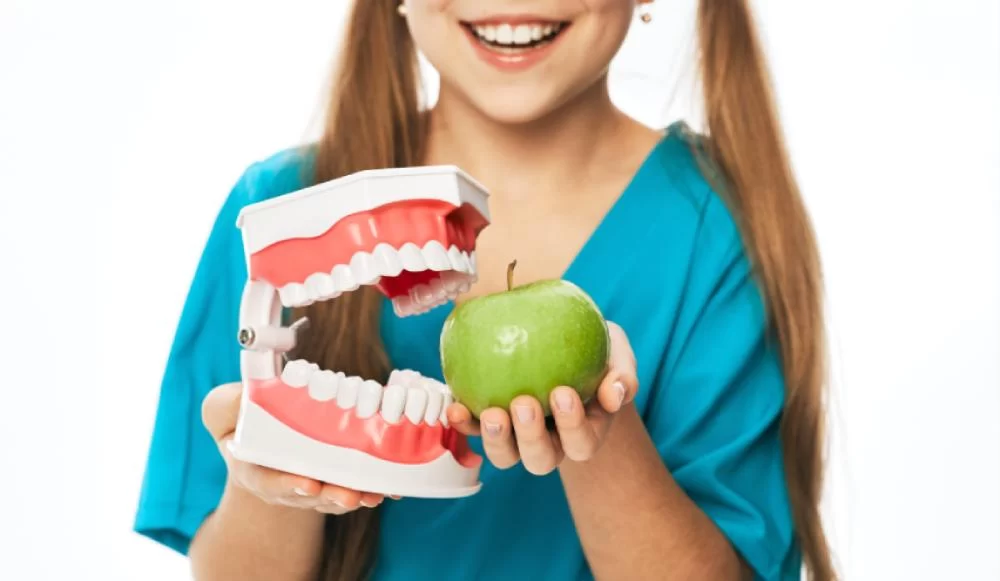
How Diet Affects Dental Health: Educating the Public
When we think about maintaining good dental health, brushing and flossing often come to mind first. While these practices are undeniably essential, the food we eat also plays a significant role in the overall health of our teeth and gums. In fact, the impact of diet on dental health is often underestimated, even though it is directly linked to the prevention of cavities, gum disease, and other oral health issues. In this article, we will explore the ways in which diet affects dental health, what foods to eat for strong teeth, and how making simple dietary changes can lead to a healthier smile. Whether you're a parent trying to teach your kids about oral health, or an adult looking to improve your own dental habits, understanding the connection between diet and dental care is key to achieving lasting oral health.
1. The Role of Nutrients in Dental Health
The foundation of good dental health starts with the nutrients we consume. The vitamins and minerals found in the foods we eat help strengthen teeth, support gum health, and even help to fight off infections. Some key nutrients to focus on for optimal oral health include:
- Calcium: Found in dairy products like milk, cheese, and yogurt, calcium is essential for strong teeth and bones. It helps maintain tooth enamel, the hard outer layer of your teeth that protects them from decay.
- Vitamin D: Vitamin D aids in the absorption of calcium, making it essential for strong teeth. Sunlight and foods like fatty fish, eggs, and fortified dairy products are great sources of this vitamin.
- Phosphorus: Another critical mineral for dental health, phosphorus works together with calcium to form and maintain strong teeth and bones. Foods such as meat, poultry, and nuts are rich in phosphorus.
- Vitamin C: Vitamin C is vital for gum health as it supports the production of collagen, a protein that helps keep gums strong. Citrus fruits, strawberries, and leafy greens are great sources of vitamin C.
2. The Impact of Sugary Foods on Your Teeth
While some foods provide essential nutrients for dental health, others can wreak havoc on your teeth. One of the biggest culprits in tooth decay is sugar. When you consume sugary foods, the bacteria in your mouth feed on the sugar and produce acids that attack your tooth enamel. Over time, this acid can cause cavities and lead to tooth decay. Common sugary foods and drinks that contribute to tooth damage include:
- Sodas and sugary drinks
- Candy and sugary snacks
- Cookies and pastries
- Fruit juices with added sugar
To reduce the risk of cavities, it’s essential to limit sugar intake and be mindful of how often you consume sugary snacks. If you do indulge in sweets, try to brush your teeth shortly after eating to minimize the damage caused by sugar.
3. Foods That Promote Healthy Teeth
On the flip side, there are plenty of foods that promote strong teeth and help to prevent dental problems. These foods provide the necessary nutrients that contribute to good oral hygiene and can even help neutralize the acids in your mouth. Some of the best foods for dental health include:
- Crunchy fruits and vegetables: Apples, carrots, and celery are natural teeth-cleaners. Their crunchiness stimulates saliva production, which helps wash away food particles and neutralize harmful acids.
- Leafy greens: Spinach, kale, and other leafy greens are rich in calcium, folic acid, and other vitamins that help protect teeth and gums.
- Cheese: Cheese is rich in calcium and protein and has been shown to help strengthen tooth enamel. It also stimulates saliva production, which helps protect against tooth decay.
- Yogurt: Yogurt is another great source of calcium and probiotics. The probiotics in yogurt can help fight off harmful bacteria in the mouth and reduce the risk of gum disease.
- Green tea: Green tea contains antioxidants that help reduce inflammation in the gums and fight oral bacteria. Drinking unsweetened green tea is a great way to support your oral health.
4. The Importance of Hydration for Oral Health
Staying hydrated is not only important for your overall health but also for your dental health. Drinking plenty of water helps maintain a healthy flow of saliva, which naturally cleanses the mouth and neutralizes acids that can damage teeth. Water also helps to prevent dry mouth, a condition that can lead to increased tooth decay and gum disease. In addition to water, other healthy beverages like herbal teas (without added sugar) can be beneficial for your oral health. Avoid sugary drinks like soda or energy drinks, which contribute to dry mouth and cavity formation.
5. How Diet Affects Gum Health
Diet plays a critical role in the health of your gums as well. Nutrient-rich foods help support healthy gum tissue, while a poor diet can lead to gum inflammation and disease. For example, vitamin C deficiency can result in gum bleeding and swelling, conditions associated with gingivitis and other gum problems. Additionally, a diet high in sugary or acidic foods can contribute to gum recession and increase the risk of periodontal disease. To keep your gums healthy, focus on eating a balanced diet with plenty of vitamins and minerals, and avoid foods that can irritate your gums.
6. The Link Between Diet and Oral Disease
Research has shown that what you eat can have a direct impact on the development of oral diseases, such as cavities, gum disease, and tooth decay. A diet rich in sugar and processed foods can increase the likelihood of these problems, while a balanced, nutrient-dense diet can help prevent them. Regular dental checkups, combined with a healthy diet, are essential for maintaining optimal oral health throughout your life. Additionally, drinking water, avoiding tobacco, and limiting alcohol consumption can further protect your oral health and reduce your risk of developing oral diseases.
Conclusion
In conclusion, diet plays a crucial role in maintaining good dental health. By focusing on nutrient-rich foods and limiting sugary, acidic foods, you can significantly reduce the risk of cavities, gum disease, and other oral health issues. Incorporating a variety of healthy foods into your diet, staying hydrated, and practicing good oral hygiene will help ensure that your teeth and gums remain strong and healthy for years to come. If you're looking to learn more about how diet can impact your dental health or to find dental care products that can help you maintain a healthy smile, be sure to visit Dentistry Toothtruth for expert advice and recommendations on maintaining optimal oral health.







 Family Dentistry of Lakewood4.0 (321 review)
Family Dentistry of Lakewood4.0 (321 review) Emergency Dentist 24/7 Downingtown1.0 (1 review)
Emergency Dentist 24/7 Downingtown1.0 (1 review) Northside Dental Clinic4.0 (281 review)
Northside Dental Clinic4.0 (281 review) Premier Orthodontics4.0 (227 review)
Premier Orthodontics4.0 (227 review) DentFirst Dental Care McDonough4.0 (534 review)
DentFirst Dental Care McDonough4.0 (534 review) Aspen Dental - Warwick, RI4.0 (600 review)
Aspen Dental - Warwick, RI4.0 (600 review) The Importance of Oral Health Education During Pregnancy for a Healthy Pregnancy
The Importance of Oral Health Education During Pregnancy for a Healthy Pregnancy Best Tips for Brushing Your Teeth Properly for Healthy Gums: Essential Techniques for Oral Health
Best Tips for Brushing Your Teeth Properly for Healthy Gums: Essential Techniques for Oral Health Why Skipping Dental Checkups Can Lead to Bigger Oral Health Problems
Why Skipping Dental Checkups Can Lead to Bigger Oral Health Problems Advantages of Porcelain Dental Restorations
Advantages of Porcelain Dental Restorations How Can Diabetes Cause Tooth and Gum Problems? Preventing and Managing Oral Health Issues
How Can Diabetes Cause Tooth and Gum Problems? Preventing and Managing Oral Health Issues Healthy Habits for Promoting Good Oral Health and Hygiene: Tips for a Healthy Smile
Healthy Habits for Promoting Good Oral Health and Hygiene: Tips for a Healthy Smile